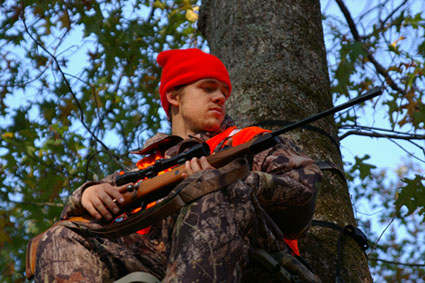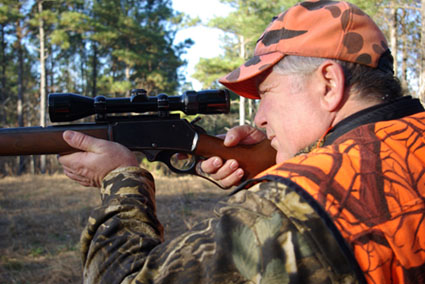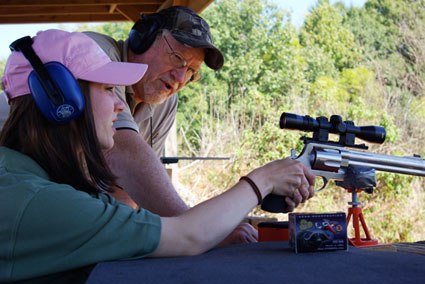 The type of gun a hunter takes to his deer stand is largely a matter of personal preference. |
While visiting a friend’s deer camp recently, I was amazed at the variety of guns being used by the 15 guys who were members of that camp.
My hunting companion was shooting the Rifled Deer version of the Browning Gold 12-gauge slug gun. His brother was shooting a Ruger Model 96/44 lever-action in .44 Mag.
A father-and-son team went the bolt-action route. One was shooting a Sporter LT version of Winchester’s Model 70 Classic chambered for .270. The other was hunting with a .243 Remington Model Seven SS.
There was one guy shooting buckshot in an old Remington 12-gauge double-barrel, and another shooting an ancient military carbine of some sort. In fact, just about every kind of rifle and shotgun you can imagine was being employed by this ragtag band of deer hunters.
This started me to thinking: if a new deer hunter had dropped into this camp, hoping to get advice on what kind of gun was best to use for killing a whitetail, the poor guy would undoubtedly have gone away confused and frustrated after hearing all the opinions floating around.
Selecting a good all-round deer gun can be a daunting task for sure. Some hunters prefer a super-accurate long-range rifle, but those are typically heavy, with long barrels. If you have to carry one of these guns over long distances in rough terrain, you might wish you’d gone with a lightweight stalking rifle instead. If you go with a lightweight model, however, you usually give up some of the true “tack-driver” accuracy obtainable with a long-range specialist. Also, light rifles are harder to hold steady for accurate shooting.
 Lever-action, bolt action or semiauto? The variety of deer guns can confuse the inexperienced. Which is best? |
And that’s just one aspect (weight) of one type of gun (rifles). Then there are shotguns to think about, and different action designs, cartridge power and a variety of stocks and barrels to consider. The variations seem endless, and some hunters become frustrated when trying to choose a gun that incorporates all the features they consider necessary in the ultimate deer gun.
Aaron Pass, one of the country’s foremost gun experts and shooting writers, says rifles are the way to go if your state gives you the option — pick a shotgun only where legally required or dictated by special safety situations.
“In most cases,” Pass notes, “the new specialized slug guns with rifled barrels and sabot slugs are very effective and accurate out to 100 yards or a bit more. Beyond 125 or 150 yards, the steeply dropping trajectories and loss of energy make even these slugs questionable. Traditional Foster-type slugs from smoothbores are rarely accurate beyond 75 yards. Buckshot is unreliable beyond 35 to 40 yards.”
So what about actions? Which is best — lever-action, pump, bolt-action or semi-auto? Hunters generally agree that the time-tested bolt-action is considered to be the most inherently accurate. But Pass adds to that line of thinking: “It is also the action type most easily refined to greater accuracy. Levers, pumps and autoloaders are all capable of various degrees of practical hunting accuracy and allow faster follow-up shots. However, if one of these is not as accurate as a shooter desires, there’s not much that can be done about it.”
And then we come to caliber. Pass says, “For truly all-around deer hunting (a national standard), a cartridge that shoots a 120- to 150-grain bullet faster than 2,500 fps is adequate out to 200 yards or so. As velocity increases, so does effective range.
 Deer can be hunted with any gun legal where they will be taken, including handguns. Test firing a variety of guns at the range can help in narrowing down the selection. |
“My personal favorite deer rifle is a Winchester M70, in .270 Win. with a 1.5x-6x Burris scope and a synthetic stock,” he continues. “I don’t shoot at extremely long range and there’s no ‘normal’ deer hunting situation I can imagine that this rig is not capable of handling. That said, there is no inherent magic in any of the above criteria. There are plenty of other combinations that would work just as well.”
Whether you want long-range accuracy, a rifle that’s a joy to carry or some other specialization, Pass recommends buying a new rifle in the configuration you desire. “The well-known rifle models — Browning’s A-Bolt, Remington’s 700, Ruger’s 77, Savage’s 110, Weatherby’s Mark V, Winchester’s 70 and others — designate the action design,” he says. “Gun makers attach a wide variety of specialized stocks and barrels to these basic actions to create a variety of specialized rifles. Hunters should check out the manufacturers’ catalogs, or visit a gun shop, and choose a combination of features that achieve the goals of functionality and design.”
In the end, finding the ultimate deer gun is largely a matter of personal preferences. Buy a gun you like that’s legal for your hunting area, one you believe will get the job done where you hunt. That’s the first step toward achieving your goal.






